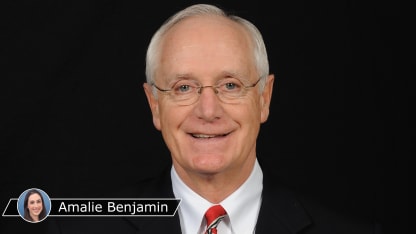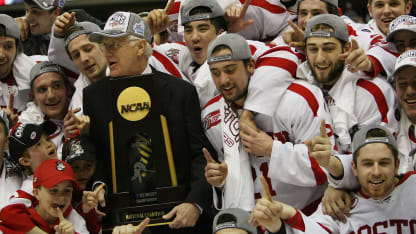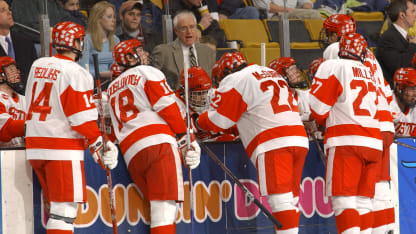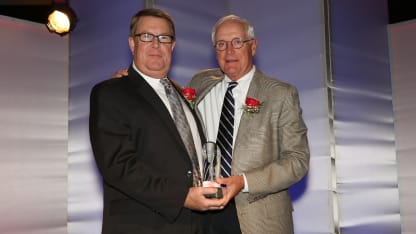Parker makes U.S. Hockey Hall of Fame after falling into coaching
2017 honoree won three national titles with Boston University

The job offer had come in late July 1968, after Riley had graduated from Boston University and lined up a hockey coaching position as the assistant at Medford High School outside Boston. But he knew he didn't really have a choice. He had to take the job at Lehigh, as athletic trainer for the football team and hockey coach, no matter that Bethlehem, Pennsylvania, is closer to New York City than Ohio.
That left him with a problem. He would be running out on Medford High, leaving his alma mater with little time to replace him before the term started. He had an idea.
"I said, 'Let me tell you something, I've got a guy who's going to be every bit as good as me, and probably do a heck of a lot better than I'll do,'" Riley, the longtime coach at UMass-Lowell, said recently. "'His name is Jack Parker.'"
Parker, who had just gotten a business degree from BU, wasn't planning on coaching. He wasn't planning on going into hockey at all. He was bound for a life of banking or finance, but wasn't entirely set on his career path. And, so, what was a little detour when it came as a favor to a friend?
Banking could wait.
"I fell into it," Parker said. "I had a lot of fun coaching Medford High that first year and I thought I would go back to graduate school, thought I would become a teacher/coach in high school and, lo and behold, [BU coach] Jack Kelley hired me as an assistant (in 1969), so I got my feet wet in college hockey and then next thing you know I was the head coach. And it was kind of, how'd this happen?"
Beginning in 1973, he was BU's coach for 40 years and 897 wins, third-most behind Boston College coach and rival Jerry York (1,042) and former Michigan State coach Ron Mason (924), winning three national titles (1987, 1995, 2009) and cultivating dozens of star players and 24 Olympians, including four key members of the 1980 "Miracle on Ice" team (Mike Eruzione, Dave Silk, Jack O'Callahan and Jim Craig).

© Elsa/Getty Images
He built a resume that could stand beside that of any coach in the college game, leading to his latest honor, induction into the U.S. Hockey Hall of Fame on Wednesday in Boston.
"It was a win-win situation," said Riley, who played with Parker at BU. "Jackie bailed me out and he got introduced to coaching. The rest was pretty much history."
\\\\
It wasn't a surprise that Parker fell in love with coaching, that he suddenly saw a future he had not yet begun to imagine. It was, however, a surprise to even him that he had set no direction for his career before coaching suddenly presented itself.
"Life just kind of happened to me," said Parker, 72. "I think you can call that immaturity.
"It really was just a matter of good fortune. How does a guy in his late 20s] who had never [had] a head coaching job in his life get to be the head coach of the Boston University hockey team?"
But he had telegraphed that this was a future that might work for him, by who he was and how he conducted himself. He had demonstrated a keen hockey sense and a respect that he would shower on his teams and his players and his opponents, one that was especially evident in the relationship he had with Travis Roy, after the BU freshman was left a quadriplegic 11 seconds into his college career in 1995.
"Really he was a tremendous leader, the way he ran the program as far as accountability, communicating with players," said New Jersey Devils coach John Hynes, who played for BU's 1995 national championship team. "There is a real culture at Boston University when you go there as a player of how hard you work, what it means to be a Boston University Terrier."
***[RELATED: [Collins officially thrilled by U.S. HHOF nod | Five named to U.S. Hockey Hall of Fame]*
It's why players who didn't even play for him, like Boston Bruins defenseman and former BU player Charlie McAvoy, listen a little extra closely when they're talking to Parker, why there was always a grudging respect for him among the players and teams his Terriers knocked out of tournament after tournament.
It's why most can't imagine him not having been part of college hockey, a scenario that nearly happened.
"It was a credit to him that he was able to get some terrific players to learn how to play hockey the right way," said BU assistant Albie O'Connell, who played for Parker. "You're getting guys that have played offense their whole life and they have been some of the best players where [they were], then we get them to buy into blocking a shot, to buy into backchecking, playing good defense and getting on the right side of people and playing hockey how it's supposed to be played."
He was honest, and sometimes sharp-tongued. He made his players earn his trust. Few players came into his program and started on the top line, the top power play, which was partially because of his approach and partially because of the talent that the program attracted.
It was, for a Boston kid, for any kid, an honor to be considered by BU, by Parker.
"I think he's someone I idolized growing up," said Bruins defenseman Matt Grzelcyk, a native of Charlestown, Massachusetts, who played at BU. "Obviously he's a special person to a lot of people in Boston. My parents in particular are real big fans of him. Just to get that call from him, to come in, was one of the experiences that will stick with me forever."

© Brian Babineau/Getty Images
It was what Parker was for so many.
"He obviously took over for a great coach, but he put BU on another level, from the way he ran the program to the players he attracted to the level of coaching to the assistant coaches that he attracted to work for him," O'Connell said. "Obviously, the proof is in the results that he had as a coach."
\\\\
Forty years of Parker. Forty years of winning and developing and creating. Forty years of building a resume worthy of the U.S. Hockey Hall of Fame. And yet, after all that time, after the rink at BU's Agganis Arena was christened Jack Parker Rink, the namesake himself still doesn't quite believe that the program is his.
To him, it still belongs to that great coach who came before him, his coach and mentor, Jack Kelley.
It was Kelley who coached Parker as a center at BU, who hired him as an assistant after that year at Medford High, who made him coach of the freshman team, a job that Parker said counted as the most fun he ever had in coaching.
It was Kelley who, in Parker's mind, defined BU hockey.
"It amazes me now when I look back on it that I coached there 40 years," said Parker, who retired in 2013. "I remember Jack Kelley coached just for 10 years and I thought it was his program. He was the one that started the foundation and built it and I was just a caretaker, I thought, and I was fortunate to be a caretaker for 40 years."
But Parker might be the only one who considers himself simply a caretaker of Kelley's program. Because that program was passed on to a coach whose results could stand up to those of almost anyone in the game.

"He's just so well-respected," McAvoy said. "It's hard to explain, a guy like Jack Parker or Jerry York or Red Berenson [of the University of Michigan], those guys that have been there for so long, coaching at their respective programs.
"They just demand a certain amount of respect that's more than other people, naturally, because of the legacy that they have, what they've done in their careers."
Of course, if there's anyone who understands that impulse, it's the man who then replaced Parker, David Quinn. If Parker believed he was following a legend, then Quinn must have had that feeling fivefold.
"I understand what he means by that," Quinn said. "Here I am five years into this and there's not a day that goes by that I don't think to myself in some quiet moment, I can't believe I'm the head coach at BU. You understand the responsibility you have and how much the sport means to the university. I understand what he means by that. It's an incredible opportunity and I know he felt how lucky he was, and I know how lucky I feel."
Especially because this was never the plan. This was never what it was supposed to be for Jack Parker.
"I always thought I was just an extension of what Jack [Kelley] built, and we were trying to keep it going," Parker said. "There was no thought on my part that I'm establishing something here that I want people to remember. It was more of, I've got to keep this thing going so people don't remember me the wrong way."
That part he managed.
"Well," he said, "it worked out."

















